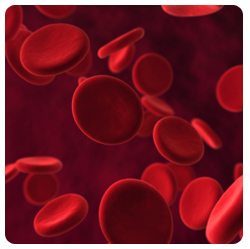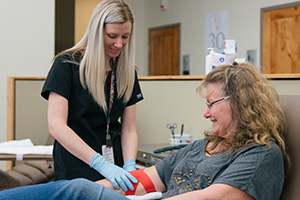
Blood has the important job of transporting oxygen, nutrients, and heat to the different tissues and organs throughout your body. It also carries waste to the lungs, liver, and kidneys for disposal. In addition, it helps your body fight infection and heal wounds. Without blood, we cannot live. Blood can only be obtained from healthy adult people. Therefore, blood donors are incredibly important to our community.
Blood, which is made in bone marrow, has four main components: red cells, platelets, plasma, and white cells. Each component has a separate and important role.
Red Cells Deliver Oxygen
Red cells are disc-shaped cells containing hemoglobin, which enables the red cells to pick up and deliver oxygen to all parts of the body. Red cells are given to patients when large amounts of blood are lost during surgery or after an accident.

Platelets Help Control Bleeding
Platelets are blood cells that help control bleeding. When a blood vessel is damaged, platelets collect at the site of injury and temporarily repair the tear. You can think of platelets like bricks that gather together at a blood vessel tear.
Plasma Carries Blood Cells and Contains Clotting Substances
Plasma is a pale yellow mixture of water, proteins, and salts. One of the functions of plasma is to act as a carrier for blood cells, nutrients, enzymes, and hormones. Another function of plasma is to help blood clot by holding the platelets together. You can think of plasma as the cement that stabilizes the platelet bricks. Once a clot is formed, the wound can heal. Severely burned patients often need a plasma transfusion as a result of losing too much of their own plasma through the damaged skin.
White Cells Defend the Body
White cells are the body's primary defense against infection. They can move out of the blood stream and help tissues being invaded. White cells are sometimes given to patients who are not responding to antibiotic therapy.
Many lifesaving medical treatments require blood transfusions. What and how many blood products are given to a patient will depend on his or her individual needs. (See Uses of Blood.) Some of the patients who typically require blood transfusions are:
- Cancer patients
- Leukemia patients
- Burn patients
- Those receiving organ or bone marrow transplants
- Premature babies
- Victims of traumatic injuries and accidents
- Patients undergoing certain surgeries
For more detailed information on the four components of blood, visit the
American Association of Blood Banks.
